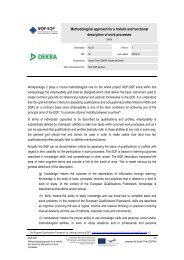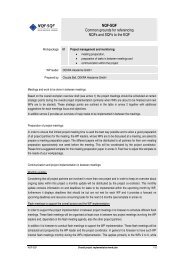Overview of National Qualification frameworks - Project-Nqf-Sqf
Overview of National Qualification frameworks - Project-Nqf-Sqf
Overview of National Qualification frameworks - Project-Nqf-Sqf
Create successful ePaper yourself
Turn your PDF publications into a flip-book with our unique Google optimized e-Paper software.
● Masterstudien (master’s degrees): are a continuation <strong>of</strong> bachelor's courses, and are designed primarilyfor the purpose <strong>of</strong> obtaining an additional scientifi c grounding; they generally last 4 semesters (2 years)and conclude with the academic title <strong>of</strong> "Master”.● Austrian technical universities currently <strong>of</strong>fer training courses in the fi elds <strong>of</strong> design - art, technology,engineering, social sciences, economics, military/national defence, natural sciences and healthcarescience. Technical university courses are also open to students with relevant vocational qualifi cationswithout matriculation (usually with an admission examination).University courses● Diplomstudien (diploma courses):● Bachelor’s and Master’s courses:● Doctoral courses:Schools for part-time students and tertiary educationAdults who have already embarked upon careers or have concluded their vocational training have thepossibility <strong>of</strong> obtaining relevant educational qualifications as part-time students taking evening classes.Part-time students can choose between academic secondary schools and medium- and higher-levelsecondary technical and vocational colleges, consolidation courses, specialised post matriculationcourses and post-secondary colleges. Universities and technical universities also <strong>of</strong>fer fur-ther educationcourses: the latter also <strong>of</strong>fer technical university courses for parttime students.Adult educationAcademic and vocational courses and programmes are <strong>of</strong>fered by institutes <strong>of</strong> adult education sponsoredby the Ministry <strong>of</strong> Education, such as colleges <strong>of</strong> further education, vocational colleges, institutes foreconomic development, denominational institutions and a number <strong>of</strong> other regional non-pr<strong>of</strong>itinstitutions for adult education.One <strong>of</strong> the main purposes <strong>of</strong> adult education is to allow students to gain qualifications not obtainedearlier by taking adult classes in the form <strong>of</strong> “second-chance education”. Institutions <strong>of</strong>fering adulteducation give interested students the opportunity <strong>of</strong> attending courses in preparation for thematriculation examination, the school-leaving certifi cate, the university entrance examination or thevocational matriculation examination (in some instances examinations may be taken in stages).3 Referencing the EQF__ Which tools are used to create an interface to EQF?The EQF descriptors will form the basis for the classification <strong>of</strong> qualifications to the Austrian NQF.Therefore, the EQF referencing process will be closely linked to the process <strong>of</strong> allocatingqualifications to the Austrian NQF.__ How are interfaces between the NQF and the EQF defined? How is it managed? How are learningoutcomes from EQF accredited in the NQF? How are qualifications from an education abroadgenerally accredited? Who is responsible for those definitions and accreditation?It is planned to draw up the report on the referencing <strong>of</strong> the Austrian NQF to the EQF in the course <strong>of</strong>2011.Key actors in the NQF development process are the Ministry <strong>of</strong> Education, Arts and Culture (bmukk)and the Ministry <strong>of</strong> Science and Research (bmwf). These ministries head the so-called NQF SteeringGroup, in which members <strong>of</strong> all ministries, the social partners and the Laender are represented. Thisgroup will also be the decision making body for the EQF referencing report.It is planned to discuss the draft Austrian EQF referencing report with the NQF Steering Group whichcompromises stakeholders from different sectors and different parts <strong>of</strong> the qualifications system.




